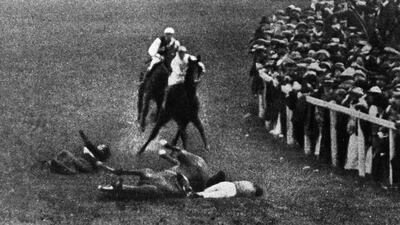The scenes of guests tripping along London's Park Lane to charity fundraisers are commonplace in the British capital; men in dinner jackets, women in ballgowns. But this month's Presidents Club dinner is already notorious as a symbol of the unfinished business of women’s equality.
A few miles away is a small junior school near the Oval cricket ground that keeps alive the name of the Victorian politician and social reformer Henry Fawcett. Until now, there has been no such marker for Mr Fawcett’s wife Millicent. But later this year she will be immortalised as her statute is placed in Parliament Square alongside those of Sir Winston Churchill and Nelson Mandela.
Mrs Fawcett was a suffragist who fought for the legal equality of women (suffragists took a more moderate line than the more militant suffragettes). It is an irony that the first woman to grace the square is honoured when wars of the sexes have taken a particularly bitter turn in British public life.
The furore over the Presidents Club event that hired scores of young women to engage and flatter the all-male audience has been massive. Fat cats are falling even further out of favour in Britain, a decade after the financial crash.
The sight of these men excitedly mobbing the women while using the cover of charitable donations struck a public nerve. Even so, the business newspaper which exposed these foibles, the Financial Times, has suffered a small backlash from its own readers.
The controversy feels like a turning point. If so, it is one that is badly needed.
The campaign led by Mrs Fawcett, and others like her, has indeed achieved much in Britain. In a few weeks, the British parliament will celebrate the centennial anniversary of the first general election in which women voted and Countess Constance Markievicz was elected the first female Member of Parliament.
___________
Read more:
Women are closing the gender pay gap but there's still plenty to fight for
British-Iraqi MP Nadhim Zahawi linked to seedy male-only dinner
Merriam-Webster's word of 2017 is feminism
___________
In law, there has been a steady improvement in protections for women. Not only voting rights but civil entitlements have been constantly upgraded. There is a marked trend of shared pooling of family responsibilities – for example, men can now share women’s maternity leave after giving birth, so that a couple can priorities the women’s career if they choose to do so.
There have been two female prime ministers, including the incumbent one. There is now a female president of the supreme court and another on the top bench. Old rules like the one that forced a woman to leave the foreign office when she got married have long been abolished.
Harassment laws have been passed. There are officially sponsored programmes to ensure women remain in the workforce. Networking and support mechanisms provide encouragement and opportunities throughout society.
And yet there are glaring examples of where privilege and power sits deep in all-male pools. The Presidents Club was not a solitary example, it was merely unalloyed in its skewed make-up. To observe that the Presidents Club dinner was a “lady zoo” is to miss the point. And yes, there are raucous female occasions, including the notorious pre-marriage hen parties. But the Presidents Club was not a one-off social event. It was the apex of stratification.
A senior Conservative politician, Margot James, last week recounted how she, as a guest speaker, was excluded from a room in a Pall Mall club because women were not allowed.
Headlines over the years have tracked golf clubs and other institutions that hold divisive membership votes on women joining as equals. Defenders of the status quo in the last such club of its kind argued it was better for women to be in the category "lady member" because the fees were lower.
Gradualists have argued for years that divisions are overcome with time and structural changes in the workforce. The demographic evolution of the economy would make it inevitable that concentration of power and wealth would be eclipsed by wider social trends.
Which goes back to the dilemma facing women like Mrs Fawcett, who spurned the approach of the likes of Emily Davison and the suffragettes, prepared to risk prison or even death (Ms Davison was fatally injured while trying to tie a protest scarf to the King's horse at the derby) to make their point.
Mrs Fawcett’s legacy is magnificent and 100 years of progress must be celebrated and extolled, not qualified or diminished.
The #MeToo movement has taken the struggle for equality between men and women across a new frontier. That is why hope exists that the exposure of the Presidents Club could bookend concepts of what is acceptable behaviour in all circumstances.
There are plenty of high-powered women in business, politics, law and the professions.
The massive pressure for wage equality has even forced the BBC to reduce male presenters' pay.
Dignity is the next great conceptual leap. The Presidents Club made no allowance for the idea that respect for equality must be explicit between men and women.
That is intangible. As men publicly applaud the positioning of Mrs Fawcett’s bronze on the plinth, they would do well to privately make that very basic change of heart.

